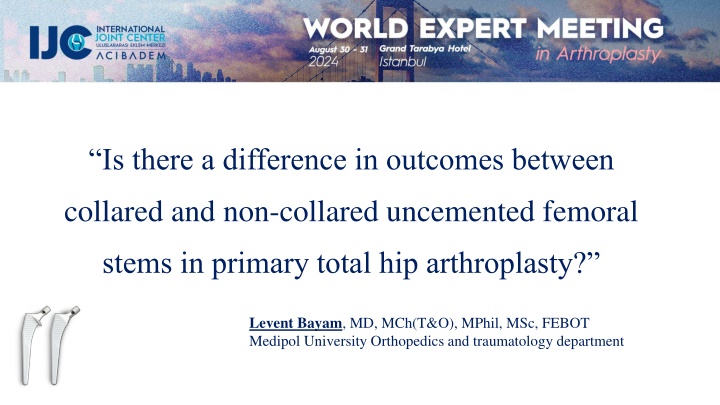Comparison of Collared and Non-Collared Uncemented Femoral Stems in Primary Total Hip Arthroplasty
Investigate outcomes between collared and non-collared uncemented femoral stems in total hip arthroplasty. Literature review reveals excellent clinical results for both types, with lower periprosthetic fracture rates in collared stems. Question the preference of collared stem in primary uncemented hip arthroplasty over collarless stem.
Download Presentation

Please find below an Image/Link to download the presentation.
The content on the website is provided AS IS for your information and personal use only. It may not be sold, licensed, or shared on other websites without obtaining consent from the author.If you encounter any issues during the download, it is possible that the publisher has removed the file from their server.
You are allowed to download the files provided on this website for personal or commercial use, subject to the condition that they are used lawfully. All files are the property of their respective owners.
The content on the website is provided AS IS for your information and personal use only. It may not be sold, licensed, or shared on other websites without obtaining consent from the author.
E N D
Presentation Transcript
Is there a difference in outcomes between collared and non-collared uncemented femoral stems in primary total hip arthroplasty? Levent Bayam, MD, MCh(T&O), MPhil, MSc, FEBOT Medipol University Orthopedics and traumatology department
Bayam L Karaytug K Feng E Marin-Pena O Tozun R Romanini E Murcia A Rana A
Why is this topic Important? Higher revision rates after total hip arthroplasty (THA) being reported for uncemented stems. There is still no clear consensus regarding uncemented collarless or collared femoral stem designs. The aim of this review is to investigate the influence of collar of femoral stem in uncemented THA.
Literature Review/Process Mesh terms used (((((((((((hip) OR (femoral)) AND (stem)) OR (arthroplasty)) OR (hip arthroplasty)) AND (cementless))) OR (uncemented)) AND (collar)) OR (collared)) OR (collarless)) AND (outcome) Number of articles retrieved:755 Screening: 264 Final number of publications:18 400 PubMed 205 MEDLINE 125 Embase 25 CENTRAL
Literature Review/Process This review included 18 studies, conducted over the last 5 years including 7 national registry studies (American, Australian, German, Norwegian, and UK) 4 systematic reviews (two of which with meta-analysis) with a high volume of patients studied that ranged from 59,518 to 337,647 hip replacements patients (more than 1 million TJA). The rest were comperative high volume studies
Findings from Literature What did literature reveal Use of both collared and non-collared uncemented femoral stems results in an excellent clinical outcome in patients undergoing total hip arthroplasty. Rate of periprosthetic fractures is lower for the collared stems despite similar survivorship
Question: Is collared stem better choice in primary uncemented hip arthroplasty than collarless stem?
Rationale: The findings from literature demonstrated; excellent survivorship rates similar radiographic and functional outcomes, and overall complication rates for both collared and non-collared stems.
Rationale: The findings from literature demonstrated; Asignificant difference between the two stems with regards to the rate of periprosthetic fracture, subsidence, and rotational instability, with data favoring collared uncemented femoral stems
Rationale: The findings from literature demonstrated; However, subsidence may not be clinically relevant as the revision rate is similar Some articles may have bias on a particular stem type.
Question: Is collared stem better choice in primary uncemented hip arthroplasty than collarless stem? Response: Use of collared stem (at least the one common stem that was evaluated) results in a reduction in the rate of periprosthetic fracture Surgeons starting to familiarize themselves with the use of a femoral stem at the start of their carrier may want to consider these findings that may influence their choice of a femoral stem.























